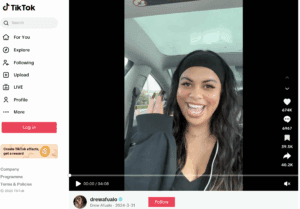Struggling to know how to improve your influencer marketing strategy? The answer might be simpler than you think: authenticity.
In a digital world flooded with polished content, audiences crave realness. They connect with creators who are transparent, relatable, and true to their values.
Authentic influencer marketing builds trust, drives engagement, and fosters lasting brand loyalty.
In this blog, we dive into why authenticity matters more than ever and highlight five standout influencers who’ve mastered it. Their journeys show how being genuine isn’t just good ethics, it’s smart marketing. Let’s explore what authentic influence looks like in action.
If you are looking for support with your digital marketing strategy, then get in touch. Our team of experts are ready to help.
What do we mean by authenticity in influencer marketing?
Authenticity is a word often thrown around in the marketing world, but what does it mean and why is it so important in the influencer marketing space.
For influencers, being authentic refers to the ways they present themselves to their audience; they should present themselves with genuinity, transparency and consistency with actions and morals. Those who seemingly follow trends for the sake of it or appear disingenuous are likely to see less engagement online than those who showcase their true personas.
When referring to authenticity, I’m not talking about posting a selfie without any makeup but authenticity about the alignment between what an influencer promotes, how they act, what they say and believe. This is especially important when influencers work with brands as the best brand/influencer partnerships are those where both parties are aligned in terms of values and the partnership ‘makes sense’ to the audience.
When an influencer promotes a brand that fits into their lifestyle and values, their audience is likely to trust and respect this partnership, which leads to the endorsements feeling credible. Audiences are then more likely to engage with the content and the partnership is likely to see success. Some of the best brand ambassadors are those who truly ‘fit’ into the brand they are working with.
You might be thinking ‘but can’t anyone pretend to be authentic to align with an audience or brand?’ and the answer is yes. Anyone can pretend to relate or appear genuine by saying and doing the ‘right’ things but influencers that do this often produce content that seems rehearsed or too strategically curated with the purpose of driving engagement. Consumers are often able to detect less genuine content and the difference between authentic and inauthentic content can be obvious.
In today’s digital world, consumers want to trust and listen to real people. Audiences want rawness from influencers; people that aren’t flawless or perfect. Influencers that speak candidly and honestly have much better engagement and growth rates than those who don’t. However, it is important to note that with authenticity, influencers are always expected to ‘be on’ and human mistakes can lead to audience upset and nowadays ‘cancellation’.
Key things that makes influencers authentic
- Consistent tone of voice
- Transparency and honesty (especially when it comes to paid partnerships.)
- Staying true to their values and morals
- Being accountable for mistakes and errors
- Not taking brand deals that don’t align with persona
- Sharing real-life experiences (both positive and negative)
What makes up authenticity? Trust, relatability and emotional connection
There are multiple elements that audiences use to determine how authentic influencers are. Three key elements that influencers need to build and display are trust, relatability and emotional connection.
Trust
Trust is a huge factor when it comes to how successful influencers are at promoting content to their audience and growing their audience base. Successful influencers often have a loyal, trusting audience as they have earned their trust through authenticity and integrity. According to a 2023 Edelman Trust Barometer study, 61% of consumers trust influencers more than brand-produced content, especially when influencers clearly use and enjoy the products they promote
Authenticity reinforces trust and vice versa. The more genuine and transparent an influencer is perceived, the more the audience will trust and likely engage with their content. Similarly, the more an audience trusts an influencer, the more authentic they are perceived. Therefore, trust is a huge factor that influencers and brands need to be aware of to ensure marketing success.
Relatability
Being relatable to an audience is a key success factor when it comes to influencer marketing. Relatability deepens the connection between an influencer and their audience. When influencers talk openly about common, everyday experiences (like mental health struggles, parenting challenges, fitness journeys), the audience are able to see themselves in that person. Relatable influencers have a powerful opportunity to make people feel less alone.
The feeling of ‘they get me’ is hard for over-produced, polished campaigns to evoke. For example, an influencer sharing a candid post about body image, accompanied by a product they genuinely use to support them, will resonate far more than a brand’s staged fitness shoot, featuring ‘flawless’ models.
As with trust, authenticity and relatability are interlinked. The more relatable the influencer is perceived, the more authentic their content will be and vice versa.
Emotional connection
Emotional connection is the glue that holds the influencing industry together. Content that evokes an emotional reaction from the audience (e.g. a break up video, a heartfelt vlog, a vulnerable livestream) can increase loyalty and trust between an influencer and their audience.
Storytelling has always been a strong tool when it comes to forming bonds and evoking emotional connection with an audience. Audiences don’t just follow; they form bonds. These bonds often translate into tangible outcomes: higher engagement rates, more word-of-mouth referrals, and increased conversions.
Overall, trust, relatability and emotional connection all contribute to authenticity and authenticity contributes to all the other factors too.
Influencer authenticity in the wild: 5 real life example
Sophie and Jamie Liang

Two influencers who have had an impressive journey to success, hugely down to their vulnerability and authenticity, are married couple Sophie and Jamie Liang.
Of course, they’re journey began on reality show, Made in Chelsea where they quickly became a fan favourite as we were able to watch their relationship grow and develop. However, the couple were smart and stopped relying on reality tv and evolved into digital creators and influencers.
Their podcast, originally titled NearlyWeds, became a hit and topped the podcast charts by documenting the ups and downs of their wedding planning journey. With candid and often hilarious discussions around everything in life (yes, everything!), they have built a loyal following who felt like part of their lives. As their relationship matured, so did their brand. The podcast was rebranded to NewlyWeds post-marriage, reflecting a genuine shift in their story. Excitingly, the couple are now expecting a baby so have rebranded again, calling their podcast Nearlyparents. I think we can all guess what the next podcast name will be!
By being relatable and trustworthy to their audience, their content on social media is equally as successful as their podcast. It is relatable, mixing playful reels, honest reflections, and I’m sure we all saw the updates on Jamie’s ultra-marathon. He showed the highs and lows that came with such a great challenge, which encouraged even more support from not only his fan base, but wider audiences too.
Their authenticity has attracted meaningful brand partnerships with companies like Spotify, F&F Clothing, HelloFresh and Aveeno who value the couple’s ability to connect on a human level. By staying humorous, and transparent, Sophie and Jamie have built more than a brand together, they’ve built trust, relatability and emotional connection with their audience making them standout examples of influencers thriving on authenticity.
Molly-Mae Hague
View this post on Instagram
I think it’s safe to say Molly-Mae is one of the most successful, if not the most successful, contestants to come out of Love Island. She is now a globally recognised influencer who is known for her openness, evolution and genuine connection with her audience.
She leveraged her fame from Love Island to build a career that embraces vulnerability, whether it’s owning up to her plastic surgery or admitting her relationship troubles or the challenges that come when raising her daughter Bambi. Her audience not only looks up to her but they see themselves in her. Her transparency deepened through YouTube vlogs and a Prime Video docuseries, Molly‑Mae: Behind It All, where she openly discussed break‑ups, motherhood, burglary trauma, and the pressures of public life. This raw honesty resonated with fans, who felt like they truly knew her, boosting trust and loyalty.
Molly Mae has achieved incredibly successful brand partnerships: She became Creative Director at PrettyLittleThing in 2021, taking an active role in styling inclusive collections and highlighting sustainability (“wear the same dress twice”). She has worked with several beauty brands; Beauty works, LookFantastic and L’Oreal.
She’s also launched her own fashion label, Maebe, and self‑tanning brand, Filter by Molly‑Mae, further aligning personal values with entrepreneurship.
By sharing flaws, growth, and real‑life milestones, Molly‑Mae has built a relatable, trusted personal brand that continues to thrive and works with house-hold brands.
Emma Chamberlain

Emma Chamberlain’s influencer success is a true testament to the power of authenticity and relatability in this space. She began her Youtube career in 2017, where her vlogs gained traction quickly due to her unfiltered, humorous vlogs with a unique editing style. Her personality shone through in her videos and resonated with a generation of people who wanted content that was real, enjoyable and genuine which set her apart from many influencers who were present during the time.
In 2019, her career really took off as she was invited to the Meta Gala by luxury fashion brand, Louis Vitton. This was the first of its time; a digital creator influencer partnership with a huge brand on this scale. This was a transition point for Emma, as she crossed into the fashion influencing space. Since then, she has worked with other fashion brands such as Calvin Klein and Levi’s. Most noteworthy of all is her partnership with Vogue, as she has hosted red carpet interviews for the brand for several years now.
Emma also has her own coffee brand ‘Chamberlian coffee’ which further expands her brand with an emphasis on sustainability and personality-driven marketing. Emma also hosts a podcast series called ‘Anything goes’ which is another impressive way to connect with her audience and offer unfiltered stories that her audience can relate to and trust.
Emma’s journey within the influencing world really goes to show how perfection is not the driving force behind success, but being personable, genuine and trustworthy is why her audience remains loyal and engaged with her content.
Bretman Rock
View this post on Instagram
Bretman Rock is a fantastic example of influencer marketing success through authenticity. Bretman rose to fame with comedic, unfiltered beauty tutorials on YouTube and Vine, and quickly gained attention for his bold personality, humor, and refusal to conform to traditional influencer norms.
His content is a blend of sass, sincerity, and cultural pride, and he never shies away from showing his true self and culture, from family dynamics to mental health to his identity.
This rawness and authenticity has built deep trust with fans, translating into major brand partnerships. Bretman has collaborated with Nike, Crocs, and built his own beauty collection. These brands value not just his reach, but his ability to impact culture.
By staying grounded in who he is, Bretman has turned his authenticity into influence as a powerful voice in fashion, beauty, and social change.
Drew Afualo

Drew Afulo’s rise in influence is fueled by her unique, rare authenticity. From her early days posing on TikTok where she responded to misogynistic comments with brutal honesty and her now famous laugh, she was able to connect with audiences on an emotional level.
She created content that not only entertained her audience but she championed them, empowered them which led to her being known as the internet’s ‘crusader for women’.
Her blend of vulnerability and humour gave her credibility and built a loyal community. That same authenticity. underpins her debut bestseller, Loud: Accept Nothing Less Than the Life You Deserve, a mix of manifesto, memoir, and guide to self‑confidence.
Being unique is her super power in the business and the reason for her impressive growth. She even said herself ‘Lean into what makes you so unique… because that’s the way people grow followings,’
Brands have noticed. With nearly 9 million followers across platforms, Drew commands plenty of brand deals. In 2025, Forbes named her one of the 30 Under 30 in Social Media.
Overall it’s clear, if you want to achieve success within the influencer marketing space, you need to be authentic, stay consistent with your moral values and emotionally connect/relate to your audience. From a brand perspective, brands need to work with the right people. A brand partnership needs to feel right. You want your audience to understand straight away, why an influencer is working with a brand and vice versa. Without that match, you are unlikely to drive the results you want.
Need support with your marketing?
If you are on the lookout for support and want to learn more about how your business can grow, then get in touch with our team.













